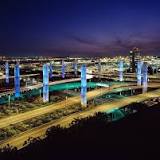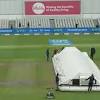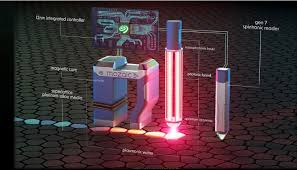West prepares Russia sanctions after Putin orders troops into Ukraine

Germany halted the approval of the Nord Stream 2 gas pipeline on Tuesday, the first in a volley of western sanctions against Moscow after Vladimir Putin ordered troops into Ukraine.
The Russian president’s decision to send in military support after recognising separatist rebel enclaves in eastern Ukraine’s Donbas region has heightened western fears of a broader offensive, triggering widespread international condemnation and the initial moves to punish Russia.
German chancellor Olaf Scholz said Berlin would not approve Nord Stream 2 given Moscow’s actions, in effect freezing Europe’s most controversial energy project. “The situation today has fundamentally changed,” he said. “And that’s why we must re-evaluate this situation, in view of the latest developments.”
By recognising the two breakaway provinces of Donetsk and Luhansk, Russia had committed a “grave breach of international law”, Scholz said. The international community would now be sending a “clear signal to Moscow that such actions have consequences”, he added.
The sanctions packages under preparation by the US, UK, EU and Japan were expected to stop short of the toughest economic curbs available, which diplomats said would be triggered if Russia were to drive deeper into Ukraine.
Ukraine’s President Volodymyr Zelensky urged the west “not to wait” with sanctions until Russia escalated its military campaign, saying “the first steps of this aggression have already been taken”.
His warning came as Russia’s state Duma, the lower house of parliament, voted unanimously to pass a law recognising the Donetsk People’s Republic and Luhansk People’s Republic as sovereign states, and ratified agreements on friendship and mutual aid between Russia and the two entities.
Russian officials gave conflicting answers on Tuesday about whether Putin had recognised the separatist enclaves in their current borders — which account for about a third of eastern Ukraine’s Donetsk and Luhansk provinces — or their claims to the entire Donbas region.
Dmitry Peskov, Putin’s spokesman, told reporters that Moscow recognised “the borders in which they exist and in which they declared [independence]” but declined to go into any further detail.
Scholz said he had effectively frozen the certification process for Nord Stream 2, which has been completed but is still awaiting approval by the Bundesnetzagentur, Germany’s energy regulator, and the EU authorities. “Without this certification, the pipeline cannot go into operation,” he said.
Critics of the pipeline have long complained it would increase the continent’s dependence on Russia and make Ukraine more vulnerable to Russian blackmail.
At the outset of Russia’s massive troop build-up on the Ukrainian border, Scholz angered critics of Nord Strem 2 by saying it was “purely a commercial project” and appearing to suggest it would not be included in any sanctions package. But his public utterances on the pipeline have hardened in recent weeks.
Nord Stream 2 AG, the operator of the pipeline, said it “took note” of Scholz’s comments but could not comment until it had “appropriate information from the authorities”. Gazprom, which owns the pipeline and was due to supply the gas that will flow through it, declined to comment.
Recommended2 hours ago

Global stocks fell on Tuesday and oil prices rallied, with Brent crude rising more than 3 per cent to close in on $100 per barrel, topping a seven-year high. Russian markets tumbled for the second day in a row. The benchmark Moex index fell about 4.5 per cent, leaving it down 14 per cent this week.
In the UK, Prime Minister Boris Johnson announced sanctions on five Russian banks and three wealthy individuals after Putin ordered troops into eastern Ukraine. In what he described as the “first tranche” of sanctions, Johnson said the people — Gennady Timchenko, Boris Rotenberg and Igor Rotenberg — will have their assets frozen and be banned from entering the UK.
“We hold further sanctions at readiness to be deployed,” Johnson said.
Bill Browder, a financier and prominent advocate of tougher sanctions on Russia, called the UK measures “pretty tepid”. The three “have been on the US sanctions list since 2018”, Browder said on Twitter.
The EU held deliberations on its measures on Tuesday, which Ursula von der Leyen, the European Commission president, and Charles Michel, the European Council president, said would be “formally tabled” in the afternoon after a discussion among foreign ministers.
The package discussed in a meeting of EU ambassadors was wider than some officials had expected. The proposals encompass restrictions on the refinancing of Russian government debt and on its central bank, as well as on about 350 members of the Russian Duma, and on individuals and businesses linked to Russian actions in the separatist regions, according to people familiar with the discussions.
The commission also wants to introduce import and export restrictions on the two regions in eastern Ukraine, modelled on a similar regime introduced after the annexation of Crimea. At least two banks that are active in the two regions could also be targeted if the proposals win unanimous support from the EU’s 27 member states, the people said.
The EU has spent months drawing up a much broader package of measures hitting Russian companies and economic sectors, as well as individuals, but they have signalled this would be deployed in the case of a full-scale Russian invasion. Such a package of measures would likely be decided by a summit of EU leaders.
On Monday night the Biden administration issued an executive order banning new investment, trade and financing by US people and entities in the Luhansk and Donetsk regions. A White House official said that further sanctions against Russia would be announced on Tuesday: “We are coordinating with allies and partners on that announcement.”
Japan said Russia’s decision to recognise separatist regions was a “totally unacceptable” violation of international law. Yoshimasa Hayashi, Japan’s foreign minister, said it merited “a tough response including sanctions”, which would be discussed with G7 countries.
China on Tuesday expressed “concern” about the latest developments in Ukraine without mentioning Russia. Wang Yi, foreign minister, told his US counterpart on a call that the legitimate security concerns of any country should be respected. “The situation in Ukraine is worsening. China again calls on all sides to practise restraint,” Wang said.
Sergei Lavrov, Russian foreign minister, shrugged off the threat of sanctions as he questioned whether Ukraine had a right to sovereignty because its government emerged through a “coup d’état”. “They are already threatening us with all manner of sanctions or, as they say now, ‘the mother of all sanctions’,” Lavrov said. “Well, we’re used to it.”
Additional reporting from Henry Foy in Brussels, Leila Abboud in Vendome and Demetri Sevastopulo in Washington


 United Kingdom
United Kingdom Argentina
Argentina  Australia
Australia  Austria
Austria  Brazil
Brazil  Canada
Canada  Germany
Germany  Ireland
Ireland  Italy
Italy  Malaysia
Malaysia  Mexico
Mexico  New Zealand
New Zealand  Poland
Poland  South Africa
South Africa  United States
United States 
















